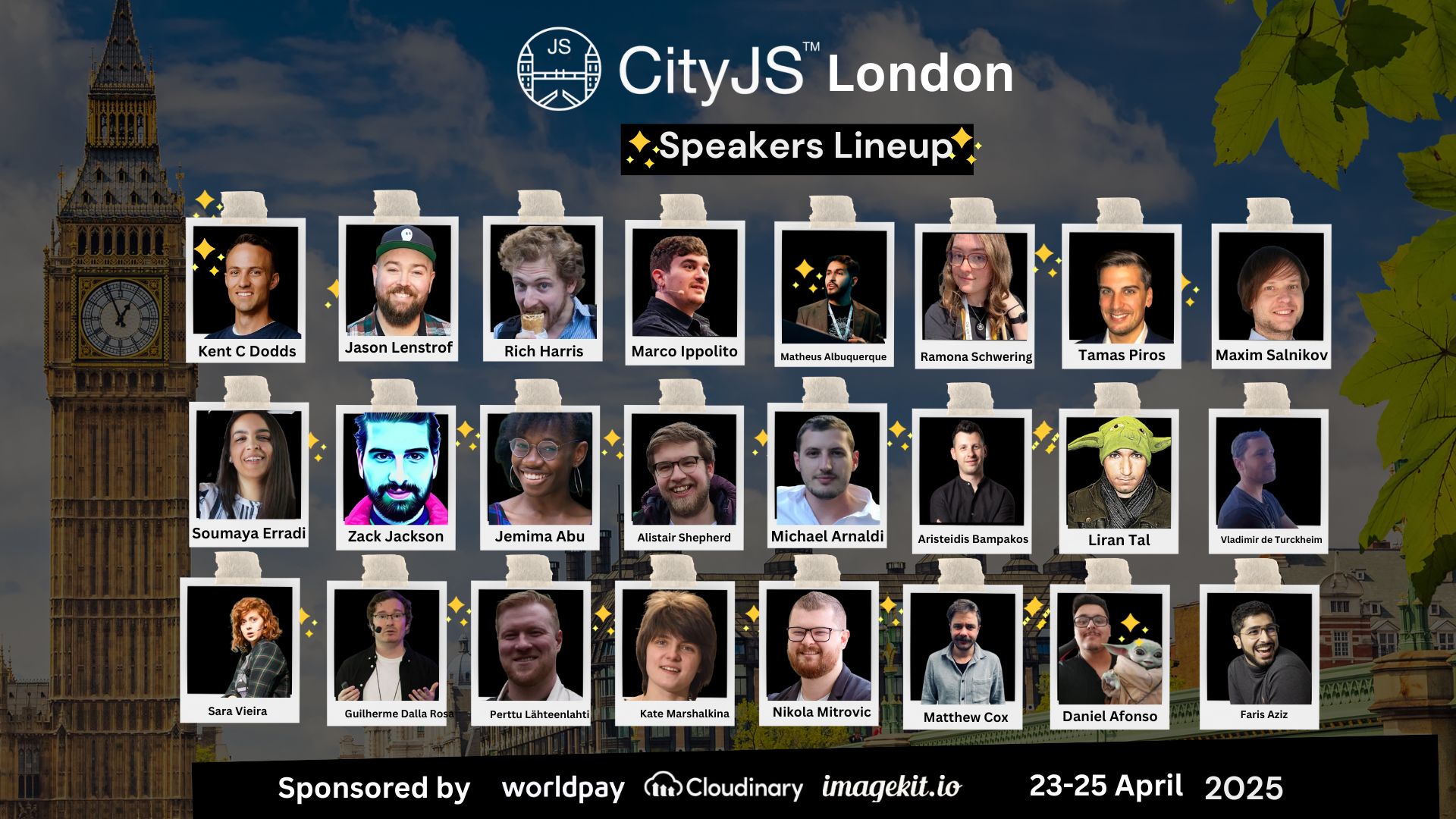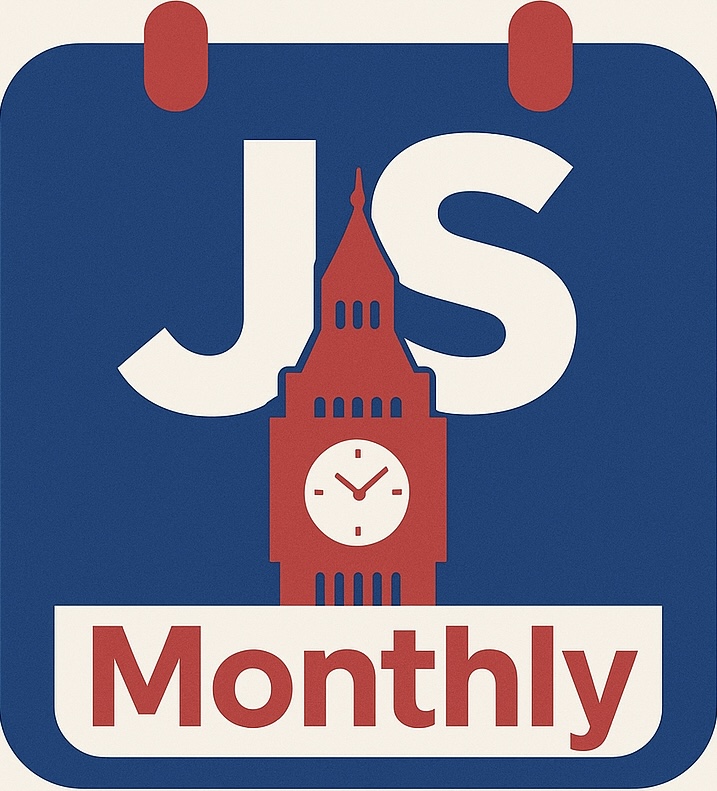
CITYJS LONDON 2025

Hosted by
JavaScript Monthly London Meetup
Wed, April 23rd-25th 2025
6:00PM to 5:00PM BST
In-Person
Address available to attendees
We missed you this time around!


For tickets please visit our website Ticket holders will be given priority to all FREE events.
We are excited to announce the full line up of our speakers for our iconic London 2025 some new faces and lots returning back to London town!
At this conference, we’ll explore a wide range of cutting-edge topics in JavaScript, Front end and Backend Web Development and emerging technologies. From architecting multi-tenant solutions with Next.js and building event-driven frontends, to leveraging generative AI and exploring micro front-end challenges at scale, we’ll dive deep into both practical and innovative approaches. You’ll learn about web security through the lens of horror movies, and understand how to incorporate AI into full-stack web development.
We’ll also cover TypeScript for native mobile development, Playwright testing at scale, and privacy-first generative AI web apps. Other exciting topics include accessible JavaScript, Svelte 5, module federation, hacking AI applications, modern testing with Node.js, gRPC streams in NestJS for real-time food ordering, 3D graphics in React & React Native, and optimizing large CX platforms at scale. Plus, get hands-on with TypeScript for IoT and discover how to build production-grade applications with Effect. This event is packed with insights to help you stay ahead in the fast-evolving world of web development.
Presentations
Jason Lengstorf
The Upside of Being Unreasonable
This talk digs into the weird stuff I do for work, and how all of it required me to be fairly unreasonable about my approach to things. I could have done a lot of things that would have been perfectly fine with far less time and effort and struggle — but I instead chose to keep pushing toward my Big Ideas™ even when no one could see the point except me. And now I'm doing a job that I love and that I'm pretty sure is unique in our industry. All because I chose to be unreasonable and do things the hard way.
Maxim Salnikov
Privacy-first in-browser Generative AI web apps: offline-ready, future-proof, standards-based
Powerful generative AI features are quickly becoming a baseline in modern development. Potential blockers include privacy concerns, the need for a stable connection, and the costs associated with using or hosting models. However, we can now leverage generative AI directly in the browser on the user's device using emerging Web APIs like WebNN, combined with higher-level frameworks, for a better developer experience. In my session, I’ll discuss the current state of in-browser ML and AI features, compare the main players, and show you how to start building an offline-ready, future-proof, standards-based web application.
Rich Harris
From Scratch
More details to be added soon.
Kent C Dodds
Principles based Programming
In software development, principles are the bedrock that guide our decisions, transcending specific tools and technologies. In this talk, we’ll delve into the significance of principles, using The Epic Programming Principles (epicweb.dev/principles) as a foundation. We’ll explore how these guiding philosophies can elevate your coding practices and decision-making processes. By the end, you’ll be inspired to reflect on these principles and craft your own, tailoring them to your unique development journey.
Tamas Piros
Full Stack Web Development with AI
Propel yourself into the future of web development. You’ll start with the essentials of building full stack applications using the Next.js framework, encompassing frontend and backend development, data routing, and application management, and then you’ll take a deep dive into the world of artificial intelligence, learning how to integrate AI features seamlessly into your web applications. Whether you're a junior developer looking to expand your skill set or a seasoned developer aiming to add AI expertise to your toolkit, you'll come away with the knowledge and hands-on experience to craft advanced web applications that leverage AI to deliver cutting-edge, intelligent user experiences.
Marco Ippolito
TypeScript Goes Native
This talk is going to tell the journey of the integration of TypeScript in Node.js with --experimental-strip-types Main point are: - Why waiting so long - How we revolutionized typescript support without source-maps - Shipping it - Unflagging - Next steps
Zack Jackson
To be Confirmed
Jemima Abu
I Can't Believe It's Not JavaScript!
When building interactive features on a webpage, JavaScript is usually the way to go. However, with great JavaScript dependencies comes great website instability. Even a minor undefined element can cause your entire webpage to crash. That’s where going back to the basics comes in. Thanks to modern Web APIs, it’s now possible to reduce JavaScript dependency on a website by swapping out JS components for their native HTML element or CSS feature counterparts. In this talk, we’ll take a look at how to use HTML and CSS to build simpler alternatives to popular JavaScript components such as accordions, modals, scroll transitions, carousels etc We’ll also take a look at the performance and accessibility benefits and real-life applications and use-cases of these components.
Alistair Shepherd
Bill and Ted’s accessibility adventure: Accessibility testing for developers
As Bill and Ted discovered in their excellent adventure, it can be easier to learn through hijinks, trials and practice than through reading. How can we learn from their experience to get better at web accessibility? Accessibility is essential to build into our work, but it has a high barrier to entry and is notoriously difficult to learn. Reading guides and specifications can only get you so far. Through my experience training my team in accessibility, I've discovered that learning accessibility testing is the easiest and most effective way of mastering accessibility. In this talk — and with the guidance of Bill and Ted — we'll explore the different ways of learning accessibility, and why focusing on accessibility testing works so well. You'll gain a method of benchmarking your work and progress, and find yourself building up accessibility experience that will last your career.
Michael Arnaldi
Effect: Production-Grade TypeScript
In this talk we will explore the problem domain that Effect solves and why it is essential to build reliable and scalable software in TypeScript especially in the backend
Ramona Schwering
From the crypt to the code: Web security explored through horror movies
From the sinister injection flaws reminiscent of "Alien" to the terrifying specter of broken authentication akin to what "The Invisible Man" is capable of, we'll explore the most common security vulnerabilities in web development. But don't worry—we'll also shed light on solutions. If you dare, join us and learn how to conquer the darkness invited by your web applications.
Liran Tal
Hacking AI Applications
You build applications using Generative AI and LLM frameworks for your JavaScript apps. Hurray! I sure hope you didn’t forget this tiny little thing called application security :-)Join me in this session, where we uncover imminent security vulnerabilities from basics to hands-on live hacking and demonstrate real-world insecure JavaScript code mistakes as we hack in the IDE and unleash exploit payloads that compromise AI-generated code. You’ll learn and experience prompt injection, LLM agents with excessive access, code vulnerabilities introduced via IDE auto-suggest tools, and how LLM sources turn into an imminent security risk.
Vladimir de Turckheim
The news of the death of JavaScript has been greatly exaggerated
How many times did we read about JavaScript being a bad language, JavaScript being on its way out and that technology X would kill it. In this talk, we will take a look at the lessons learnt from attempts at killing JavaScript. We will start as early as the late 90s where the battle for web-domination was still open. Then we will travel through time to understand the current state of an hypothetical javascript-less web platform.
Guilherme Dalla Rosa
Architecting Multi-Tenant Solutions with Next.js and the App Router
In this talk, we'll explore the key characteristics of multi-tenant architectures and how to implement scalable solutions using Next.js. We'll dive into the features of the App Router to serve dynamic and personalized content to users, leveraging strategies like ISR (Incremental Static Regeneration).
Perttu Lähteenlahti
3D graphics in React & React Native using React-three-fiber
3D experiences are awesome, but they can feel a bit intimidating, especially for regular web developers. In this talk, I’ll show you that building 3D graphics doesn’t have to be hard, even if you’re just starting out. I’ll focus on how to get 3D graphics running on both web and mobile apps. You don’t need to be an experienced developer—the very basics of React will be enough to get started.
Kate Marshalkina
At the top of the pyramid: Playwright testing at scale
In the past year, we went from zero to 20,000 lines of Playwright tests, pushing its capabilities beyond basic end-to-end testing. This talk will explore the challenges we encountered as we scaled our Playwright setup and how we solved them, thanks to the robust ecosystem and team creativity.
Nikola Mitrovic
gRPC Streams in NestJS: Delivering Real-Time Food Ordering 🍕
Craving real-time excitement in your delivery app? This talk serves up a delicious recipe for building live, engaging experiences with gRPC streams and NestJS, seasoned with a dash of RxJS! Dive into the world of gRPC bidirectional streaming and see how this powerful technology can deliver a constant flow of information, from sizzling kitchen updates to the precise location of your delivery driver, all while empowering your kitchen staff with instant order notifications. Discover how gRPC streams enable lightning-fast communication, efficient data transfer, and a truly responsive user experience for your next-generation delivery app.
Matthew Cox
Event Driven Frontends. What, why and how.
Within an event-driven, microservices architecture there's often a big gap between a web component that relies on some data, and the event data itself. There will usually be several services in the middle, from multiple APIs, databases, distributed caches etc. Building and updating that web component might mean touching many codebases and coordinating across many teams. This can be slow and hamper experimentation. What if... we bring that raw event data right into the browser, making it, in effect "event driven"? That web component can be developed and iterated on at lightning speed. New components can be built without the need for new endpoints. With access to the raw data, frontend developers suddenly have the freedom to explore new, bold ideas without fear of the upstream complexity.
Platform Sponsors

Torc is a community-first platform bringing together remote-first software engineer and developer opportunities from across the globe. Join a network that’s all about connection, collaboration, and finding your next big move — together.
Join our community today!

Don't let broken lines of code, busted API calls, and crashes ruin your app. Join the 4M developers and 90K organizations who consider Sentry “not bad” when it comes to application monitoring. Use code “guild” for 3 free months of the team plan.
https://sentry.io

We missed you this time around!


Platform Sponsors

Torc is a community-first platform bringing together remote-first software engineer and developer opportunities from across the globe. Join a network that’s all about connection, collaboration, and finding your next big move — together.
Join our community today!

Don't let broken lines of code, busted API calls, and crashes ruin your app. Join the 4M developers and 90K organizations who consider Sentry “not bad” when it comes to application monitoring. Use code “guild” for 3 free months of the team plan.
https://sentry.io
CITYJS LONDON 2025

Hosted by
JavaScript Monthly London Meetup
Apr
23
Wed, April 23rd-25th 2025
6:00PM to 5:00PM BST
In-Person
Address available to attendees
For tickets please visit our website Ticket holders will be given priority to all FREE events.
We are excited to announce the full line up of our speakers for our iconic London 2025 some new faces and lots returning back to London town!
At this conference, we’ll explore a wide range of cutting-edge topics in JavaScript, Front end and Backend Web Development and emerging technologies. From architecting multi-tenant solutions with Next.js and building event-driven frontends, to leveraging generative AI and exploring micro front-end challenges at scale, we’ll dive deep into both practical and innovative approaches. You’ll learn about web security through the lens of horror movies, and understand how to incorporate AI into full-stack web development.
We’ll also cover TypeScript for native mobile development, Playwright testing at scale, and privacy-first generative AI web apps. Other exciting topics include accessible JavaScript, Svelte 5, module federation, hacking AI applications, modern testing with Node.js, gRPC streams in NestJS for real-time food ordering, 3D graphics in React & React Native, and optimizing large CX platforms at scale. Plus, get hands-on with TypeScript for IoT and discover how to build production-grade applications with Effect. This event is packed with insights to help you stay ahead in the fast-evolving world of web development.
Presentations
Jason Lengstorf
The Upside of Being Unreasonable
This talk digs into the weird stuff I do for work, and how all of it required me to be fairly unreasonable about my approach to things. I could have done a lot of things that would have been perfectly fine with far less time and effort and struggle — but I instead chose to keep pushing toward my Big Ideas™ even when no one could see the point except me. And now I'm doing a job that I love and that I'm pretty sure is unique in our industry. All because I chose to be unreasonable and do things the hard way.
Maxim Salnikov
Privacy-first in-browser Generative AI web apps: offline-ready, future-proof, standards-based
Powerful generative AI features are quickly becoming a baseline in modern development. Potential blockers include privacy concerns, the need for a stable connection, and the costs associated with using or hosting models. However, we can now leverage generative AI directly in the browser on the user's device using emerging Web APIs like WebNN, combined with higher-level frameworks, for a better developer experience. In my session, I’ll discuss the current state of in-browser ML and AI features, compare the main players, and show you how to start building an offline-ready, future-proof, standards-based web application.
Rich Harris
From Scratch
More details to be added soon.
Kent C Dodds
Principles based Programming
In software development, principles are the bedrock that guide our decisions, transcending specific tools and technologies. In this talk, we’ll delve into the significance of principles, using The Epic Programming Principles (epicweb.dev/principles) as a foundation. We’ll explore how these guiding philosophies can elevate your coding practices and decision-making processes. By the end, you’ll be inspired to reflect on these principles and craft your own, tailoring them to your unique development journey.
Tamas Piros
Full Stack Web Development with AI
Propel yourself into the future of web development. You’ll start with the essentials of building full stack applications using the Next.js framework, encompassing frontend and backend development, data routing, and application management, and then you’ll take a deep dive into the world of artificial intelligence, learning how to integrate AI features seamlessly into your web applications. Whether you're a junior developer looking to expand your skill set or a seasoned developer aiming to add AI expertise to your toolkit, you'll come away with the knowledge and hands-on experience to craft advanced web applications that leverage AI to deliver cutting-edge, intelligent user experiences.
Marco Ippolito
TypeScript Goes Native
This talk is going to tell the journey of the integration of TypeScript in Node.js with --experimental-strip-types Main point are: - Why waiting so long - How we revolutionized typescript support without source-maps - Shipping it - Unflagging - Next steps
Zack Jackson
To be Confirmed
Jemima Abu
I Can't Believe It's Not JavaScript!
When building interactive features on a webpage, JavaScript is usually the way to go. However, with great JavaScript dependencies comes great website instability. Even a minor undefined element can cause your entire webpage to crash. That’s where going back to the basics comes in. Thanks to modern Web APIs, it’s now possible to reduce JavaScript dependency on a website by swapping out JS components for their native HTML element or CSS feature counterparts. In this talk, we’ll take a look at how to use HTML and CSS to build simpler alternatives to popular JavaScript components such as accordions, modals, scroll transitions, carousels etc We’ll also take a look at the performance and accessibility benefits and real-life applications and use-cases of these components.
Alistair Shepherd
Bill and Ted’s accessibility adventure: Accessibility testing for developers
As Bill and Ted discovered in their excellent adventure, it can be easier to learn through hijinks, trials and practice than through reading. How can we learn from their experience to get better at web accessibility? Accessibility is essential to build into our work, but it has a high barrier to entry and is notoriously difficult to learn. Reading guides and specifications can only get you so far. Through my experience training my team in accessibility, I've discovered that learning accessibility testing is the easiest and most effective way of mastering accessibility. In this talk — and with the guidance of Bill and Ted — we'll explore the different ways of learning accessibility, and why focusing on accessibility testing works so well. You'll gain a method of benchmarking your work and progress, and find yourself building up accessibility experience that will last your career.
Michael Arnaldi
Effect: Production-Grade TypeScript
In this talk we will explore the problem domain that Effect solves and why it is essential to build reliable and scalable software in TypeScript especially in the backend
Ramona Schwering
From the crypt to the code: Web security explored through horror movies
From the sinister injection flaws reminiscent of "Alien" to the terrifying specter of broken authentication akin to what "The Invisible Man" is capable of, we'll explore the most common security vulnerabilities in web development. But don't worry—we'll also shed light on solutions. If you dare, join us and learn how to conquer the darkness invited by your web applications.
Liran Tal
Hacking AI Applications
You build applications using Generative AI and LLM frameworks for your JavaScript apps. Hurray! I sure hope you didn’t forget this tiny little thing called application security :-)Join me in this session, where we uncover imminent security vulnerabilities from basics to hands-on live hacking and demonstrate real-world insecure JavaScript code mistakes as we hack in the IDE and unleash exploit payloads that compromise AI-generated code. You’ll learn and experience prompt injection, LLM agents with excessive access, code vulnerabilities introduced via IDE auto-suggest tools, and how LLM sources turn into an imminent security risk.
Vladimir de Turckheim
The news of the death of JavaScript has been greatly exaggerated
How many times did we read about JavaScript being a bad language, JavaScript being on its way out and that technology X would kill it. In this talk, we will take a look at the lessons learnt from attempts at killing JavaScript. We will start as early as the late 90s where the battle for web-domination was still open. Then we will travel through time to understand the current state of an hypothetical javascript-less web platform.
Guilherme Dalla Rosa
Architecting Multi-Tenant Solutions with Next.js and the App Router
In this talk, we'll explore the key characteristics of multi-tenant architectures and how to implement scalable solutions using Next.js. We'll dive into the features of the App Router to serve dynamic and personalized content to users, leveraging strategies like ISR (Incremental Static Regeneration).
Perttu Lähteenlahti
3D graphics in React & React Native using React-three-fiber
3D experiences are awesome, but they can feel a bit intimidating, especially for regular web developers. In this talk, I’ll show you that building 3D graphics doesn’t have to be hard, even if you’re just starting out. I’ll focus on how to get 3D graphics running on both web and mobile apps. You don’t need to be an experienced developer—the very basics of React will be enough to get started.
Kate Marshalkina
At the top of the pyramid: Playwright testing at scale
In the past year, we went from zero to 20,000 lines of Playwright tests, pushing its capabilities beyond basic end-to-end testing. This talk will explore the challenges we encountered as we scaled our Playwright setup and how we solved them, thanks to the robust ecosystem and team creativity.
Nikola Mitrovic
gRPC Streams in NestJS: Delivering Real-Time Food Ordering 🍕
Craving real-time excitement in your delivery app? This talk serves up a delicious recipe for building live, engaging experiences with gRPC streams and NestJS, seasoned with a dash of RxJS! Dive into the world of gRPC bidirectional streaming and see how this powerful technology can deliver a constant flow of information, from sizzling kitchen updates to the precise location of your delivery driver, all while empowering your kitchen staff with instant order notifications. Discover how gRPC streams enable lightning-fast communication, efficient data transfer, and a truly responsive user experience for your next-generation delivery app.
Matthew Cox
Event Driven Frontends. What, why and how.
Within an event-driven, microservices architecture there's often a big gap between a web component that relies on some data, and the event data itself. There will usually be several services in the middle, from multiple APIs, databases, distributed caches etc. Building and updating that web component might mean touching many codebases and coordinating across many teams. This can be slow and hamper experimentation. What if... we bring that raw event data right into the browser, making it, in effect "event driven"? That web component can be developed and iterated on at lightning speed. New components can be built without the need for new endpoints. With access to the raw data, frontend developers suddenly have the freedom to explore new, bold ideas without fear of the upstream complexity.
Get in touch!
hi@guild.host